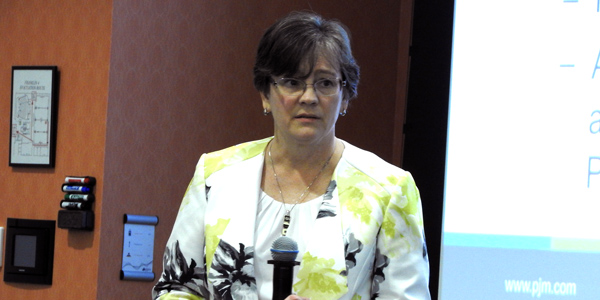By Rory D. Sweeney
VALLEY FORGE, Pa. — Only a few PJM stakeholders attended Monday’s special Planning Commission session on cost-containment provisions in bids on transmission projects, but they came prepared to defend their opposing positions.
PJM’s Sue Glatz reviewed proposed changes to Manual 14F to incorporate cost-containment principles that were identified by stakeholders in previous meetings of the group, including submission requirements, what submission information will be kept private and evaluation guidelines.
Much of the debate at the Oct. 9 meeting occurred over what should or should not be specifically stated in the manual.
Sharon Segner, with merchant transmission developer LS Power, disputed PJM’s plan to require bidders to explain the rationale behind requested exclusions from the proposal’s cost cap. The decision could be for competitive reasons that don’t aid PJM’s analysis but might harm the bidder, she said.
Jodi Moskowitz of Public Service Electric and Gas supported PJM’s plan to require the supporting rationale for exclusions. She questioned why the requirement was a concern given that supporting information should be treated on a confidential basis.
“Isn’t a lot of this information redacted?” she asked.
Segner requested that the manual language guarantee the confidentiality of bidders’ explanations for any exceptions to their proposed cost cap, such as if the prices for certain materials change drastically or the anticipated siting route fails to receive approval.
“If you’re asking for supporting rationale [to be included within proposals], it should be made clear in the business practice language that that rationale will not be made public,” she said.
Glatz said she would investigate what changes might better protect “commercially sensitive language.”
Creating Clarity
Stakeholders disagreed on whether to enunciate that PJM will not consider any cost-cap guarantees beyond those related to construction costs, although they “may be included in the project proposals,” and that winning bidders are free to “propose, through the FERC ratemaking process, other cost-cap mechanisms associated with the project.”
Segner and Greg Poulos, the executive director of the Consumer Advocates of the PJM States, agreed that the language improves clarity, even if they didn’t agree with the policy itself. However, PSEG’s Vilna Gaston and Delaware Public Service Commission staffer John Farber opposed it because they felt it suggests powers that go beyond PJM’s actual authority.
“I think the FERC ratemaking process speaks for itself,” Farber said. “The PJM approval process should not be involved with those ratemaking issues.”
“You have no authority to say what someone can file or not file at FERC [or] what FERC can consider,” Moskowitz said.
Poulos and Segner agreed that their preference would be for “more opportunity for cost caps in other areas,” but that the language demarcates exactly what is PJM’s policy.
“I think this is a very helpful sentence because it creates clarity,” Poulos said. “It’s very clear what PJM is considering and not considering.”
“Part of the reason that this whole stakeholder process is going on is because varying types of cost containment proposals are being proposed,” Segner said. “I don’t think it’s obvious that other forms of cost containment won’t be considered unless it’s spelled out.”
“I think what I’m hearing is that people do like the clarity but don’t want something that creates the illusion” that PJM has authority to control what can be filed at FERC, Glatz said, attempting to summarize the proceeding.
‘Over the Top’
Gaston and Segner again clashed on whether to include requirements that any confidential information that is inadvertently disclosed could not be used in the future by any third parties for any purposes.
“I think that’s over the top,” Segner said in opposing the requirement, suggesting its intended purpose was to muzzle state regulators and consumer advocates.
“It’s not really about protecting the bidders against each other,” she said. “The issue is how it could be used against you later in a litigation proceeding, and you’re trying to put language in that would exclude that type of information in a litigated proceeding.”
“That’s not the intent,” Gaston said. “There’s confidential information that may be competitive information.”
Glatz said she’d ask PJM’s attorneys “how complicated that is” to include.
PJM hopes to receive endorsement for the rule changes in time for the upcoming planning year, which would mean bringing it to the Planning Committee for a vote in December at the earliest. Stakeholders asked for another meeting or video conference before then to finalize their requests. Glatz said she would search for an available date prior to the November committee meeting.







